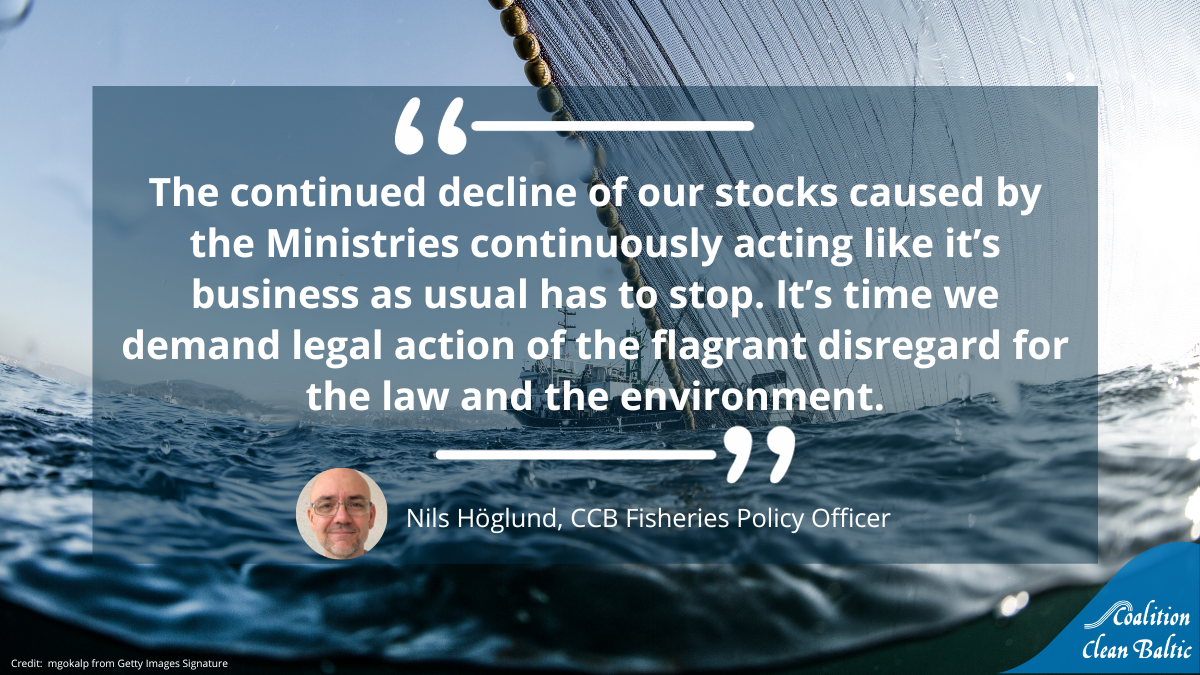NGOs request legal scrutiny of Ministers decision to continue fishing on Baltic herring stocks in decline
Did the fisheries Ministers act in accordance with the law when setting Baltic fishing quotas for this year? We, Coalition Clean Baltic (CCB), seriously question this and will tomorrow ask the EU Council to review its decisions to continue removing large quantities of herring even when stocks are far below safe levels. It is time to get legal clarity of what considerations must be taken when fisheries Ministers sit in all night sessions and decide on issues of detrimental importance to the ecosystem.

16 January 2024 - In light of the very poor status on the Baltic Sea and its fish stocks, CCB is requesting an internal review from the Council to seek explanation of how the past October AGRIFISH Council decisions are valid and meet the legal requirements in place.
“The continued decline of our stocks caused by the Ministries continuously acting like it’s business as usual has to stop. It’s time we demand legal action of the flagrant disregard for the law and the environment”, says Nils Höglund, CCB Fisheries Policy Officer.
The legal situation regarding human activities at sea is admittedly fragmented and seemingly unclear in regards to legal interpretation. However, it is clear that there are safeguards in place to prevent the setting Total Allowable Catches (TACs) too high or even to allow any fishing at all when the situation is serious. These safeguards have now been breached and in doing so, the Ministers have also made it nearly impossible to reach any of the environmental targets their own governments have supported just a few months ago [1] .
“Setting fishing quotas cannot be done in isolation from requirements set by EU environmental legislation or international agreements [2], nor from the ecosystem, which needs to sustain itself. Coastal fishermen, NGOs and citizens alike ask themselves if the Ministers have lost all reason when they allow continued fishing of a stock after stock disappearing from the coast. We certainly ask if it’s even legal to make such decisions.” continued Nils Höglund.
What considerations must be taken by the AGRIFISH Council of Ministers when deciding on fishing opportunities annually? This is the core of the request for internal review that CCB is submitting. Specifically, CCB wants clarity into how the rules should be interpreted, considering in particular the herring stocks in the central Baltic Sea. This stock was indicated by ICES advice [3] to be below safe levels, and also noted that the stock will likely not grow above the lowest reference level in the year 2025 even with zero fishing in 2024.
The right to request an internal review of the Council's decision is given to NGOs such as CCB via the EU Aarhus regulation (Regulation (EC) No 1367/2006). This is a rule CCB has not utilized earlier. It is a crucial scrutiny right given to civil society and private citizens to be able to question the legality of public decision making.
ENDS
Background
The AGRIFISH Council in October disregarded the Commission proposal and instead opted to keep a targeted herring fishing open and allow a large sprat fishery with known bycatch of herring, and also big issues with misreporting herring as sprat, to continue. CCB thinks this decision is illegal and seeks clarity as to what considerations should be taken and what the correct interpretation of all the rules in place implies for Council decisions on fishing opportunities.
In doing so, CCB considers it clear that the Council decided to ignore the safeguards and limits and they ignored the poor state of the Baltic Sea, the food web dynamics and clear warnings that genetically distinct sub-populations of also herring are at risk. There is no viable justification for not acting in time and the margin of discretion the Council may have to set any TAC is very low.
CCB makes the case that the Council did not act on all the information available and they did not act with caution as stipulated by the precautionary approach in the Treaty on the Functioning of the European Union (TFEU), Common Fishery Policy (CFP) etc. even when information is missing, yet risks to the stocks are known.
Notes
Coalition Clean Baltic (CCB) - Is a politically independent, non-profit association, which unites 23 NGOs, with over 1 500 000 members in all countries around the Baltic Sea. The main goal of CCB is to promote the protection and improvement of the Baltic Sea environment and its natural resources for present and future generations. More info at: www.ccb.se
[1] EU regulation 2016/1139 (as amended) establishing a multiannual plan for the stocks of cod, herring and sprat in the Baltic Sea. See specifically article 4.6 and article 5 outlines actions to be taken when stocks fall below safe levels.
[2] The key questions are related to the rules in the Baltic Sea multi annual management plan for herring, sprat and cod, to the rules in the Common Fisheries Policy (CFP) and the environmental objectives in primarily the Marine Strategy Framework Directive (MSFD). Also important is the link to the Birds and Habitat Directive as well as international treaties and regional agreements.
[3] ICES advice for fishing opportunities in the Baltic Sea in 2024:
https://www.ccb.se/scientific-advice-states-that-baltic-sea-herring-stocks-are-below-safe-levels-ngos-stop-while-there-is-still-time
CCB & other NGOs and small scale fishermen´s reaction on ICES advice for fishing opportunities in the Baltic Sea in 2024:
https://www.ccb.se/scientific-advice-states-that-baltic-sea-herring-stocks-are-below-safe-levels-ngos-stop-while-there-is-still-time
Contacts
Nils Höglund (English, Swedish)
nils.hoglund@ccb.se
+46708679249

